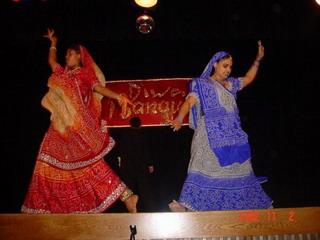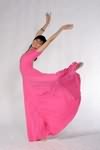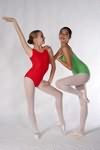| . |
 Oman
Centre for Traditional Music is just one of the dance
companies, Omani dance schools, dancing organizations and dance wear suppliers
that that can be found in our comprehensive Directory of Oman
Dance
Companies. Oman
Centre for Traditional Music is just one of the dance
companies, Omani dance schools, dancing organizations and dance wear suppliers
that that can be found in our comprehensive Directory of Oman
Dance
Companies.
Traditional Omani Dance
Most Omani music accompanies dance and is present at celebrations of all
kinds around the country. Music and dance celebrate births and weddings, are
used for healing and at times of national pride. Men and women dance
accompanied by musical instruments that display the cultural influences of
the larger region – stringed instruments from the Arab world, wind
instruments from Persia, drums from Africa, and even bagpipes, originally
from Egypt but more recently played by British military troops in residence
in Oman, all influence the sounds of Omani music. Musical ensembles from
Sohar on the northern Batinah coast, Quriyat outside Muscat and Salala, in
the southern governorate of Dhufar entertained and instructed audiences in
the joys of Omani celebrations.
| Featured
Omani
Dance Company |
Oman Centre for Traditional
Music - The importance of dance in Oman funun
The first thing that captures the attention of a non-Omani who
watches traditional Omani funun is the fact that they always
include some form of movement. Dance is an important element in
the structure of Oman's traditional arts. Movement is always
closely linked to the musical form, its role and its function in
society. For example, the movement in the religious genre, the
malid is suitable to the sober, religious situation. The
participants in the tauhid part move and sway in a solemn way
which emphasizes the religious purpose. In order to stress the
element of joy in entertainment genres, dancers in the rabbuba
genre, for example, step in a very light and quick way to the
fast joyful rhythm which is accentuated by fast drum beats.
Conversely, the female dancer moves very slowly to the
seven-unit rhythm to express her sad feelings in the dan genre
of Dhofar.
If you would like your Oman Dance Company, Dance Organization, Dance School featured here
then please email
bangkokcompanies@gmail.com
|
There are many fine dance schools in
Oman. I know I am in contact with them as we
supply a range of high quality dancewear products like leotards, dance
pants, dance dresses and other dancing apparel.
Bangkok Companies supplies an amazing range
of dancewear from Thailand. I have looked at these dance garments and dance
accessories in detail. There is only one word to describe them Superb.
For more details click on the pictures or send an email to
bangkokcompanies@gmail.com We
regret at this time we can only satisfy Oman
wholesale dancewear requests.
"Dancewear designed by
dancers for dancers"
| Dance
Dresses |
Kids Leotards |
Adult
Leotards |
Dance Bras |
|
 |
 |
 |
 |
|
| |
Dance Pants |
Tutu's |
Dance
Shorts |
|
 |
 |
 |
 |
|
| Dancewear |
Dancewear Organizers |
Dance Bags |
Dance
Backpacks |
|
 |
 |
 |
 |
|
Bangkok Companies is a full service
product sourcing company in Thailand. For All your
dancewear needs please email
bangkokcompanies@gmail.com with your requests.
Dance Schools in Oman, Dancewear Suppliers, Dancing Organizations
Mr. Jumah b. Kh. al Shidi
Oman Centre for Traditional Music, Ministry of Information
PO Box 1000 OM-111 Seeb Oman
Tel. (968)601317; Fax: (968)697667
Researcher, folk dances
--------------------------------------------------------------------------------
Mr. Khalfan al-Barwani, Chair
Oman Centre for Traditional Music, Ministry of Information
PO Box 1000 OM-111 Seeb Oman
Tel. (968)601317; Fax (968)697667, (968)723059
khalfan30@hotmail.com
Researcher, folk dances, Oman, Arab Gulf states; Arab countries
--------------------------------------------------------------------------------
National Commission for Education, Culture and Science, Ministry of
Education
PO Box 3 OM-112 Muscat Oman
Tel. (968)704.852, 796.790; Fax (968)705.659
Organization
The Omani dance of death
The lament of dan, known as fan al'dan, dates from pre-Islamic and having
roots in the African traditions. The name of the dance comes from its
lyrics, which is constructed around the repitition of the word dan. The word
is without any significant meaning, but does allow for the expression and
improvisation of emotional and sorrowful sighs as in the word "owf," in the
Syrian Mawwal. The dance emotional power draws upon a powerful dramatic
context, in which a close female member of the deceased performs a ritual
dance surrounded by a circle of men. As a ritual lamentation dance,
performed by selected members of the society from both genders, dan
represents the highest expression of grief within the culture of Oman.
Mourning itself is a way of life, which allows for the attainment of an
intensified state of confinement and an attempt to relieve its frustration.
The participation of women in this dance is highly unusual. Unlike other
parts of the M.E, where public display of emotions by women is usually
policed, the woman dancer in dan is liberated from such restraints. Though
greater freedom is permitted in private funeral in the M.E, in a Lebanese
society of Druze, for example, a female dirge singer at a funeral is
instructed not to invoke excessive grief, not to beat herself nor dance
while singing and not to sing before male listeners. This is obviously not
the case with dan, where both male and female participate equally in
creating the shape and ethos of the dance. Greater freedom is permitted in
private funeral by the women lamenter so that she can make others cry.
Further, some societies view laments performed without strong emotion as an
honorable gesture to the deceased. But for the Omani society, the
participation in such an expressive domain, like a funeral, represent one of
the main social outlets for women. The dancing ritual of dan allows for
greater level of outpouring of emotions, usually policed and controlled by
the strict rules of society. For this reason, lament is not only a tribute
to the deceased, but an avenue in which women are expected to express
mourning through crying. Unlike men, who restrain and suppress their
emotions, women greet each each other at the door by hugging and crying. The
level of intensity in such situations is so high that tears flow naturally
and intensely mixed with extensive shouting and sporadic crying.
But in the recent decades, and due in parts to the rapid change in the
socio-political life in Oman, there seems to be a move by the society
towards the suppression of the dance. This new attitude reflects a tendency
associated with urban attitude to control feelings from excessive emotions,
especially those of pain and grief. This problem has been amplified by the
gradual disappearance of the tradition, in which the young population seem
to move away from participating in the traditional social rituals of the
elders. They see such practices as primitive and old fashion and are often
ashamed of being associated with such tradition.
In any society, the death of a beloved person represents the catalyst of
sorrow and grievances and catharcism. Ritually and religiously, it serves as
a metaphysical communication outside the official forum of formal customs of
funerals. More than just grief, pain refers to an intense and extraorinary
emotional state, manifesting itself specifically and structurally through
the lament. In the lament, the role of the performer is to move the audience
to ponos, pain, and establish a connection between the livings and the dead.
The stylized interjections of the dancer and their movement are a clear
manifestation of grievance and the creation of extraordinary space that goes
beyond our existential domain. In dan, these symbolic rituals are seen in
the women tearing her cloths and loosing consciousness. Yet, in many
instances, this state of pain and high emotional intensity does not diminish
a singer's control of conventions and compositional techniques.
The dance of dan is found exclusively in the Southern region of Oman. In
particular, it is a dance accompanied by lyrics, that used to be performed
in the city of Mirbat and its neighboring city, Taqah. The two cities are
sea-ports overlooking the Arabian Sea and had long traidtion of trades and
fishery.
The dance is performed by a close member of the deceased, with the exception
of the mother. In most circumstances it is the grandmother, but other
members like aunts may participate. The event is usually held after dark at
the deceased house within three days of his/her death. In the past, both
women and men participated in forming the circle surrounding the dancer, but
it seems like tradition favor the men. This, however, does not mean that
women are not present at the performance. They do sorround the males and
participate in the singing of the refraine (the repeated verse sung). The
women dancer who enters the circle should be completely covered with black
cloth. She is not allowed to ware any jewelry, perfume, or make-up.
The dance begins with the men forming a circle. They establish the rhythm of
the piece by pounding softly on the ground. This pounding will slowly
increase in intensity and tempo as the piece develops. In one of the corners
sit the musicians, composed of three drummers and a person blowing on a
carved shell that produces a single note. While the drums produce different
rhythms, the shell is blown against the rhythm in syncopation, symbolizing
an ominus event. Shrtly thereafter, the women dancer enters the circle and
begins to dance slowly and tragically. When she reaches the center of the
circle, she sits down holding her face and begins to cry.
The music of dan is made of short repetitive phrase based on the title of
the dance. There is a definite correlation between the lamenting behavior
and the dynamic re-shaping of a repeating melody that is enticing and
befitting the somber occasion. The dance may lasts from five to ten minutes
culminating in the dancer tearing her clothes off symbolically. This act
represents the woman's desire to depart with her beloved and the severe pain
inflicted upon her by his departure. At many instances, the woman may loose
consciousness and reaches the state of tance. The aim of such ecstatic state
is to establish contacts with the transcendental plane. In such cases, an
appropriate substitute is available to continue the dance. It is uncommon
for men to loose conscious as well, seduced by the 1) persisting beat of the
drumms, 2) the loudness of the ominous sound of the shell, 3) the men's
pounding on the ground, 4) the emotional intensity surrounding the circle,
5) the presence of close member of the deceased including the dancing in the
middle, 6) the burning incense and their long metaphoric association with
the supernatural, 7) and darkness. All these factors contribute to the
dance's powerful expression and dramatic gestures.
|
|



 Oman
Centre for Traditional Music is just one of the dance
companies, Omani dance schools, dancing organizations and dance wear suppliers
that that can be found in our comprehensive Directory of Oman
Dance
Companies.
Oman
Centre for Traditional Music is just one of the dance
companies, Omani dance schools, dancing organizations and dance wear suppliers
that that can be found in our comprehensive Directory of Oman
Dance
Companies.










